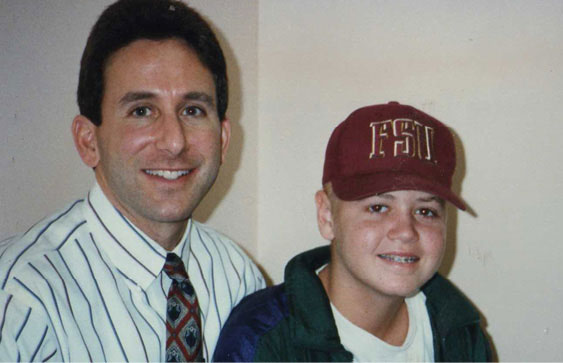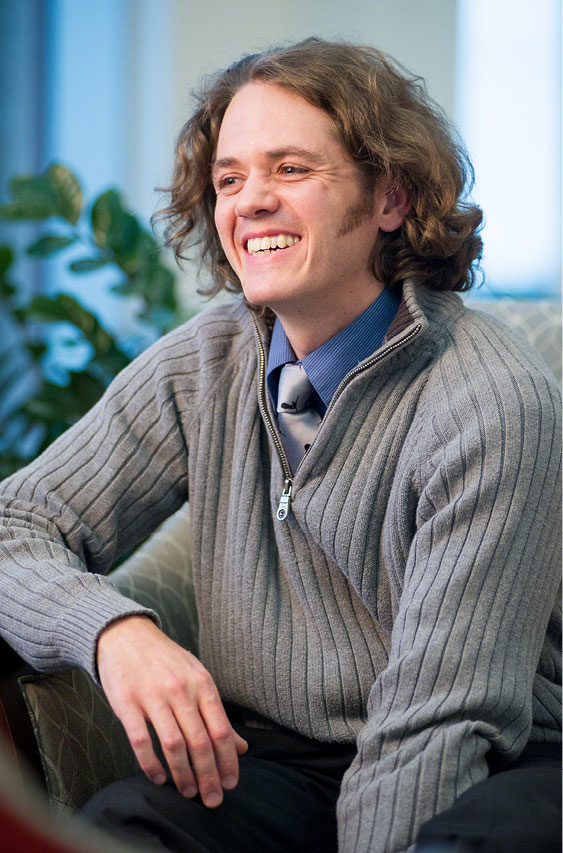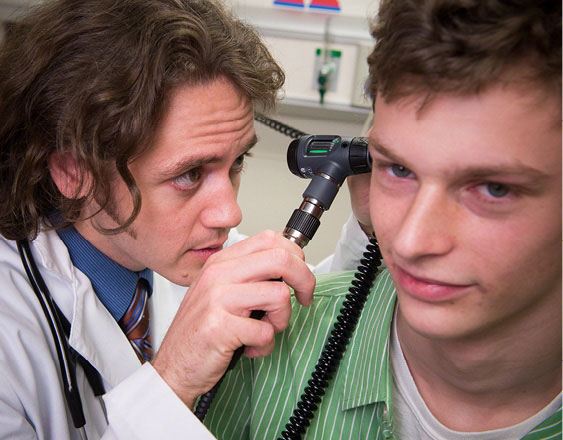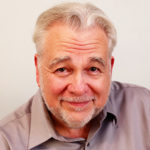When Jason Schwartz was 13, life was totally cool. School was good, girls were great, and he was gloriously obsessed with playing football for his junior high school team in Louisiana.
Then one school day in 1995, his parents showed up to check him out of classes. “We have to go to St. Jude,” they told him.
A couple of weeks earlier, they’d taken him in for tests when they noticed swollen lymph nodes. He felt fine though, and kept playing football, dreaming of going pro. But two days after a game, he was on a plane to Memphis, Tennessee. His world flipped upside down by fear, confusion and a diagnosis of acute lymphoblastic leukemia.
Like most who receive a cancer diagnosis, Jason was overwhelmed. His awesome life had, as he put it, just turned 180 degrees. He always figured he’d enjoy his first airplane flight, but this sudden trip—he couldn’t even say goodbye to his dog—was taking him away from friends and football to a strange hospital in a strange city.
Related: 9 Ways to Deal with Change
Jason had heard of St. Jude Children’s Research Hospital and knew sick kids were there. He also saw that his new journey would change everything. The teenager began battling for his life that day, and later he would declare war on behalf of every child stricken by leukemia.
Today Jason Schwartz is in the middle of a three-year fellowship as a pediatric oncologist at St. Jude. The journey to this point began the night he walked through the automatic glass doors of the hospital, a teenager full of dread and questions, expecting cold hallways and strangers. Instead, at around 9 p.m., warm, welcoming people met him and his parents. “Those couple of hours of my life are really clear, and because that passion and commitment remain today, 20 years later, now I’m the person waiting up late for these folks.”
Schwartz’s resolve to give back began growing during his first days as a patient. Even then he was more curious than scared, thinking, How does it work? Will it work? “Because I’m in it to win it, right?” He was always drawn to science, but now he was in the middle of it. During the 2½ years of weekly treatments, his inquisitiveness kept growing.

ST. JUDE CHILDREN’S RESEARCH HOSPITAL
Lymphoma division Jeffrey E. Rubnitz, M.D., PhD., was Dr. Schwartz’s primary oncologist when he was a patient at St. Jude Children’s Research hospital.
“Halfway into treatment, I was like, This is what I’m going to do. I started this laser focus that this was my goal and these are the steps that I have to get there.”
What followed was a lot of schooling, medical training and intensive study. While finishing college, Schwartz interned at St. Jude for three summers. He went on to earn a Ph.D. and an M.D. He did a pediatric residency at Vanderbilt University and is now with St. Jude’s Pediatric Hematology-Oncology Fellowship Program. At the end of his fellowship, Schwartz can sit for the pediatric hematology-oncology board exam and then, he says with a chuckle, “It’s time to find a job.”
Schwartz hopes St. Jude, a place he knows so well, will take him on permanently. Walking the colorful hallways, he stands out because of his long mane and serious sideburns. It’s a statement. His hair fell out during chemotherapy in the mid-1990s, so this style choice is a rebuke to the disease he fights.
During his fellowship, that battle includes research and patient work that is challenging but gratifying. The first year is clinical, seeing patients. The second and third years are mostly research-oriented, working in the lab using, for example, genomics to study DNA sequencing of cancer cells to understand their behavior. He’s trying to unravel what happens in patients with myelodyslastic syndrome, a bone marrow failure that can progress to leukemia.
 ST. JUDE CHILDREN’S RESEARCH HOSPITAL/ANN MARGARET
ST. JUDE CHILDREN’S RESEARCH HOSPITAL/ANN MARGARET
Justin Baker, M.D., director of the Hematology/Oncology Fellowship Program, observes Schwartz’s work. “He is laid-back but laser-focused, a weird combination,” Baker says. “His personality is endearing and he’s easy to open up to, but he can also focus on exactly what needs to be done and is unrelenting in making that happen.”
Not surprisingly, Schwartz handles patient relationships deftly. Sharing his story as a former St. Jude patient is something he does sparingly, though. “I’m not one to say, ‘Hey, I’m Dr. Schwartz, a former patient.’ My goal is to never take the spotlight away from the patient. It’s important that they feel that incredible big hug when they get here.”
“He didn’t interact like doctor to patient but like patient to patient because he’s been there on both sides of the syringe.”
Instead he watches for a difficult moment when sharing his story might help. Or if a patient asks, as Scott Merling did, Schwartz will open up about his illness and treatment. Scott, then 16, came to St. Jude when Schwartz was starting his fellowship in 2014. “I was his first patient,” Scott says. “He didn’t interact like doctor to patient but like patient to patient because he’s been there on both sides of the syringe.”
Stephanie Merling, Scott’s mother, says Schwartz helped the family deal with the process. Scott had been going to chemo for several months and it was brutal, “a mental battle every time,” she says. Schwartz suggested some shenanigans to keep Scott’s mind off the ordeal.
If a game or a bit of silliness can help, Schwartz’s fun-loving nature will make it happen. He told Scott that a squirt gun or some well-aimed Silly String could be useful when chemo was looming, although that wasn’t the only time. During a photo session for St. Jude, the young patient aimed at Schwartz with Silly String. And when Scott was momentarily distracted, Schwartz returned the favor. “I think he probably appreciated that I was using his gift even if not on the right person,” Scott says.
Baker says Schwartz knows to take care when telling patients that he understands what they’re going through. “He’s gotten more and more confident,” Baker says, “and he knows how to use his story to motivate patients and families, letting them know they have options for the future.”
While Schwartz’s own fight against leukemia ended years ago, he remains involved in the St. Jude LIFE Study, which follows patients throughout their lives. Survivors like Schwartz return periodically for a physical exam and lab work; they also might do a treadmill stress test, heart pictures and MRIs, or neuropsychological testing where “you sit with a psychologist for three hours, beating your brain against the wall to try to remember things,” says Schwartz, who describes the experience as fun. “I’m always willing to be a lab rat.”
When St. Jude was founded in 1962, the childhood cancer survival rate was 20 percent. Now it’s more than 80 percent, but that statistic doesn’t diminish the grief of losing a patient. “I’ve had some of my clinic patients die,” Schwartz says. “As a physician, you know the numbers. When you’re dealing with a patient whose chances aren’t good, you try to be as honest as you can. When they’re teenagers, it’s easier to be honest because you can get on their level easier than a child. The physician is at a little bit of an advantage to deal with the emotional side of things, because—sometimes, not all the time—you can see it coming. And you start preparing yourself early.
Related: 6 Ways to Keep Your Attitude Up When Life Tries to Bring You Down

ST. JUDE CHILDREN’S RESEARCH HOSPITAL
“But a parent is never going to be prepared for when they lose their child. As a parent myself, trying to comfort another parent, I try to at least imagine the pain.”
Away from the hospital and lab, he’s devoted to his wife, Mindy, and their two daughters. He also has a grueling hobby: endurance sports, namely, triathlon. “My colleagues and friends make fun of me because when I do something, I tend to do something to the full extent. Maybe ‘obsession’ might be thrown around there sometimes.”
He applies knowledge from his Ph.D. in biochemistry and molecular biology to his endurance training. “The science of nutrition and fueling your body for hours on end is quite interesting to me. At the same time it’s a way to stay fit, because, to put it plainly, I’m trying not to voluntarily do anything that could potentially make me have cancer again.”
Schwartz also uses his running to St. Jude’s advantage by competing in the hospital’s marathon. That sort of giving back is common among those who have been to St. Jude as patients or parents. Richard C. Shadyac Jr., president and CEO of St. Jude’s fundraising arm, says Schwartz’s story is remarkable but not unusual. “When folks come back, they have a tendency to be some of our best fundraisers,” Shadyac says. “It’s emblematic of a large group of people working here to contribute to the mission.”
Schwartz is grateful—both to St. Jude and his family—for their support during his journey. When he first came to St. Jude, his family was there for him. “We recycled our strength. When I was having a bad day, my parents were typically encouraging that day. But if they were having a bad day, I was likely having a really good day and I was able to tell them it was OK.”
Upon returning home, Schwartz found support with a balance of sympathy and encouragement. “Some teachers saw when it was not a good day. They’d say, ‘Take your time to do it.’ But it was never, ‘Oh, you don’t have to do it.’ ”
Schwartz also reaps tremendous sustenance from his church and strong faith. “The reason I feel that I’m successful—although I’m still not perfect and have a lot to learn—is because of a higher being. I certainly call upon him daily, especially in those surprisingly hard times.”
Related: Finding Hope in Tragedy
This article originally appeared in the November 2016 issue of SUCCESS magazine.


